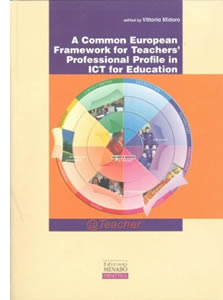A Common European Framework for Teachers' Profess
 edited by Vittorio Midoro
edited by Vittorio Midoro
Edizioni Menabò DIDATTICA
Pubblicato nel: 2005
Pagine: 160
Prezzo: 15
Download PDF
Abstract:
At the beginning of 2000, the European Commission launched the eLearning Initiative and Action Plan to foster the adaptation of the European Union's education and training systems to the knowledge society through the effective and relevant use of Information and Communication Technologies and the Internet for learning.
The eLearning Initiative and Action Plan provide the basis for a wide debate at European level and encourage increased coordination of related actions within and between Member States.
This book is an outcome of the uTeacher project, carried out in the context of the eLearning Initiative during the period December 2003-June 2005. uTeacher aims to understand and define the professional profile of a teacher who is faced with the issues that the knowledge society and ICT pose to schools. This profile is captured in a "Common European Framework for Teachers' Professional Profile in ICT for Education" (CEF) which is the subject of this book. The CEF can be seen as a means for the exchange and transfer of experience in Initial Teacher Education (ITE) and Continuing Professional Development (CPD) across Europe. The CEF also provides an opportunity for educational administrators, course designers, teachers, examining bodies, etc. to reflect on their current practice, with a view to situating and coordinating their efforts and to ensuring that they meet the real needs of school in the knowledge society.
This is the second of two books produced by uTeacher. The first, entitled European Teachers Towards the Knowledge Society, is strictly linked to this one, as it examines teachers' professional profile pertaining to ICT for education that various European countries have assumed as a basis for benchmarking their ITE and CPD and their accreditation.
It should be stressed that a clear understanding of the actual professional profile currently assumed as a basis for ITE and CPD across Europe was a prerequisite for defining the Common European Framework. This understanding could only have been achieved through a participative process involving field experts from all European countries. Accordingly, this book not only describes the CEF itself but also the cooperative process that was set in motion to produce it.
The book is the result of a cooperative effort carried out by the project partnership working in tandem with the network of European experts, called National Investigators (NI), that was established in uTeacher. Some of NIs have written sections of this book, drawing on guidelines provided by the partnership, while others have acted as reviewers.
The book is divided into ten chapters. The first describes the conditions that have made it imperative to develop a Common European Framework on Teachers' Professional Profile in ICT for Education, as well as the basic aspects related to the CEF (concept, definition, structure and users) and the development process adopted. The second chapter provides a description of the teacher's values and attibutes underpinning the eight sectors of the CEF. The subsequent chapters (three to ten) provide a detailed examination of the 32 areas included in the CEF structure.
INDICE:
- About the authors 6
- Preface 8
- 1. Building a Common Framework for Theacher's Professional Profile in ICT for Education 10
- Context 10
- Laying the foundations of the Framework 11
- The teacher's professional profile in ICT for education 13
- A cooperative approach to the definition of the CEF 17
- The CEF structure 18
- 2. Teachers' values and attributes within a knowledge society 23
- Teachers' personal and professional values: a new challenge 23
- The teacher's key attributes 25
- 3. Pedagogy 27
- Teachers' interaction with the self 29
- Teachers' interaction with pupils 32
- Teachers' interaction with colleagues 37
- Teachers' interaction with the external environment 42
- 4. Curriculum / Subject matter 47
- Teachers' interaction with the self 48
- Teachers' interaction with pupils 52
- Teachers' interaction with colleagues 57
- Teachers' interaction with the external environment 61
- 4.a Curriculum / Subject matter foreign languages 65
- Teachers' interaction with pupils foreign languages 66
- 5. Organisation 71
- Teachers' interaction with the self 73
- Teachers' interaction with pupils 76
- Teachers' interaction with colleagues 81
- Teachers' interaction with the external environment 84
- 6. Technology 87
- Teachers' interaction with the self 88
- Teachers' interaction with pupils 90
- Teachers' interaction with colleagues 93
- Teachers' interaction with the external environment 95
- 7. Professional development 97
- Teachers' interaction with the self 98
- Teachers' interaction with pupils 100
- Teachers' interaction with colleagues 102
- Teachers' interaction with the external environment 104
- 8. Ethics 107
- Teachers' interaction with the self 109
- Teachers' interaction with pupils 112
- Teachers' interaction with colleagues 116
- Teachers' interaction with the external environment 120
- 9. Policy 125
- Teachers' interaction with the self 127
- Teachers' interaction with pupils 130
- Teachers' interaction with colleagues 133
- Teachers' interaction with the external environment 136
- 10. Innovation 139
- Teachers' interaction with the self 141
- Teachers' interaction with pupils 144
- Teachers' interaction with colleagues 147
- Teachers' interaction with the external environment 150
- Glossary of terms and abbreviations 155
Il testo puo essere acquistato presso:
Menabò srl,
via Roma 88, 66026 Ortona (Chieti)
tel. e fax 0859062001
